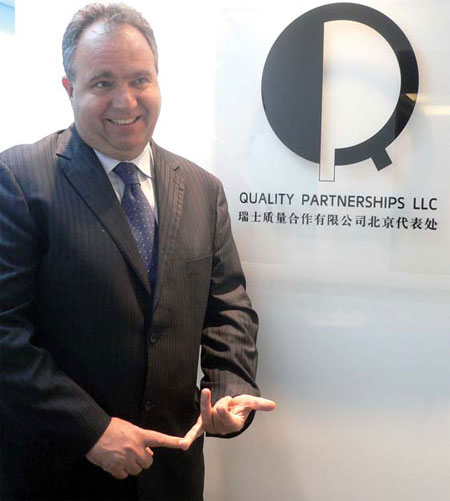Open for business
Updated: 2012-11-16 11:23
By Meng Jing (China Daily)
|
|||||||||||
|
Klaus Ziegler's Quality Partnerships aims to help secure quality licenses for small and medium companies from Europe to get into the Chinese market. Meng Jing / China Daily |
Quality Partnerships to bring more European goods to Chinese market
Even though the majority of Chinese people still drink instant coffee that can be made for 1 yuan (16 US cents; 0.13 euros) per cup, some of the world's most expensive coffee machines are available in the Chinese market.
The person helping to make this happen is Klaus Ziegler, the founder and president of Switzerland-based Quality Partnerships, which helps European companies obtain market-access licenses in China.
He has brought coffee machines from brands based in Switzerland and Italy to the Middle Kingdom, where these products are priced from 4,000 yuan to 20,000 yuan.
By comparison, brand-name made-in-China coffee machines can be bought for as little as 200 yuan.
China, however, has a thirst for more than coffee. As more and more Chinese customers are willing and able to pay for high-end products made outside China, Ziegler says there will be a promising future for his company.
"China's demand for imported goods is growing very fast. The more the Chinese consume, the bigger our business will be," he says.
Though China's exports to the EU from January to September fell 5.6 percent to $250.46 billion (196 billion euros) from the previous corresponding period, imports rose 2.1 percent to $160.53 billion, according to the General Administration of Customs.
The 50-year-old Swiss national, who has been appointed as the Seconded European Standardization Expert for China since 2006, a semi government-run project supported by major European standardization bodies, European Free Trade Association and the European Commission to reinforce the cooperation on standards between Europe and China, founded the company in 2009, after witnessing the difficulties faced by foreign small and medium-sized enterprises trying to gain licenses for the Chinese market.
"European producers don't need licenses to put their products on their home market. But around 50 percent of trade goods between Europe and China need some kind of license and it is expensive and time-consuming for European companies to get licenses in China," says Ziegler, who has decades of experience in standardization, certification and testing.
According to him, a license for the Chinese market requires a very specific application procedure, and it is very difficult for foreign companies to understand how Chinese governments and organizations operate.
As such, it is unsurprising that market access has long been a major concern for smaller European businesses in China.
Approximately a half of European Chamber member companies asserted that they lost out on business opportunities due to market access and regulatory barriers in the annual Business Confidence Survey 2012.
And the requirement for licenses is one of China's typical market access barriers, according to the chamber's annual European Business in China Position Paper released in September.
"There's a cultural translation behind it. If you don't follow, you get stuck in the process. There might be incomplete documentation, failures in testing or missing references to Chinese standards. So we help them to smooth and accelerate the process, to avoid mistakes and to keep time and cost under control," says Ziegler.
Quality Partnerships' focus on China Compulsory Certification, the only national multi-sector market access system in China, has successfully secured 40 licenses and certifications for clients over the past two years.
The company is currently working on 20 cases to help companies enter sectors such as electrical home appliances, medical devices and motor parts.
Ziegler's resume includes a stint at SGS in Japan, the world's leading inspection, verification, testing and certification services provider.
"I always wanted to set up my own business and I came to China because I thought that's the place where things are going to happen in the next couple of years," he says, adding that working for the SESEC project has helped him to understand some fundamentals of making business in China.
After starting with just one other employee in 2009, Ziegler has grown Quality Partnerships into a company with six full-time employees, three part-time employees and three freelancers.
He says the company's revenue jumped by tenfold to 500,000 euros ($637,600) in 2011 from 50,000 euros in 2008.
Ziegler is very excited about this rapid growth and says he plans to "stay for good" in China.
"The market for companies like us is enormous," he says, adding that the EU was China's largest trading partner for eight consecutive years between 2003 and 2011, and China has been the EU's second-biggest trading partner.
Ziegler says that despite Chinese standardization systems becoming more professional and mature over the past two to three years, they are also becoming more complex.
"So my small business has the potential to turn into something serious," he says.
His Beijing representative office is now a locally registered foreign investment enterprise, in line with his ambitious expansion plan in China.
"In two to three years, I want to add testing and inspection into our business. We are now only a consulting company to help people get licenses and certification; it doesn't make sense if we want to play big in China," Ziegler says.
mengjing@chinadaily.com.cn
(China Daily 11/16/2012 page13)
Today's Top News
Rescuers race against time for quake victims
Telecom workers restore links
Coal mine blast kills 18 in Jilin
Intl scholarship puts China on the map
More bird flu patients discharged
Gold loses sheen, but still a safe bet
US 'turns blind eye to human rights'
Telecom workers restore links
Hot Topics
Lunar probe , China growth forecasts, Emission rules get tougher, China seen through 'colored lens', International board,
Editor's Picks

|

|

|

|

|

|






